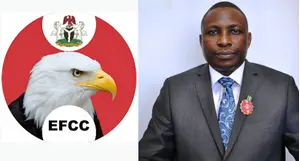EFCC's New Chief Olukoyede Issues Asset Declaration Directive for Staff
EFCC's Executive Chairman, Ola Olukoyede, mandates asset declaration for staff to ensure transparency and integrity in the fight against corruption.
Olukoyede's Directive: Asset Declaration for EFCC Staff

The newly appointed executive chairman of the Economic and Financial Crimes Commission (EFCC), Ola Olukoyede, has wasted no time in setting the tone for a renewed commitment to combating corruption in Nigeria. During a recent address to senior staff of the EFCC, Olukoyede issued a directive that carries significant weight in the battle against economic and financial crimes.
Olukoyede's directive is a straightforward yet crucial one: all EFCC staff, from level 17 and below, are to declare their assets. This directive aligns with civil service regulations and procedures, reinforcing the principle that those at the forefront of the fight against corruption must lead by example.
The announcement was made on October 24, 2023, at the corporate headquarters of the EFCC in Abuja, where Olukoyede emphasized the importance of maintaining the highest standards of integrity in the anti-corruption crusade. He has already declared his own assets, setting a clear precedent for the agency's personnel.
Addressing the EFCC staff, Olukoyede stressed the need for transparency and accountability. He made it clear that asset declarations would not be a mere formality but subject to thorough investigation. This approach ensures that all staff members uphold the highest ethical standards, setting the stage for a corruption-free environment within the EFCC.
The executive chairman underlined the primary mission of the EFCC – the fight against economic and financial crimes – and highlighted the vital role the agency plays in contributing to the nation's economic growth. He called on staff to not only investigate and combat corruption but also to promote an environment conducive to investment and economic development.
Olukoyede's vision is clear: the EFCC should inspire confidence among investors, fostering an accountable and transparent governance structure in Nigeria. This, he believes, is the path to restoring the nation's reputation and encouraging economic growth.

In addition to the call for asset declarations, Olukoyede emphasized the need for professionalism, thoroughness, and unwavering integrity among the EFCC staff. The agency's work must be driven by an unrelenting commitment to justice and the pursuit of truth, free from any partisan bias.
The chairman assured the EFCC workforce of improved welfare packages, enhanced training opportunities, and an environment that promotes equal chances for professional growth. However, he also issued a stern warning to those who might contemplate compromising their roles or engaging in unsavory conduct. Consequences for such actions would be severe, reinforcing the chairman's commitment to a clean and corruption-free EFCC.
In the fight against economic and financial crimes, leadership by example is of paramount importance. Olukoyede's directive for asset declarations is not merely a procedural requirement; it is a statement of intent, setting a new standard for the EFCC and its staff. By adhering to the principles of transparency, accountability, and integrity, the EFCC can truly be at the forefront of Nigeria's journey towards a corruption-free society and a thriving economy.
Ola Olukoyede's leadership will undoubtedly play a pivotal role in defining the agency's future trajectory, and his early actions send a strong signal that the EFCC is poised for a renewed and resolute commitment to its mandate in the years to come. The fight against corruption has found a champion in Olukoyede, who recognizes the need for the EFCC to lead the nation by exemplifying the values it seeks to instill in others.



